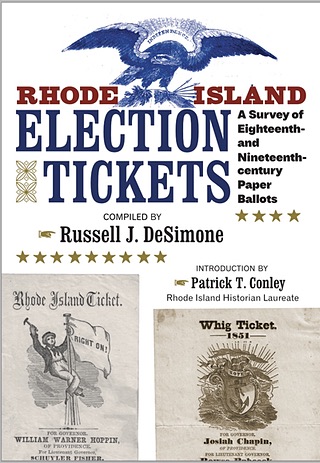
Rhode Island Election Tickets: A Survey of Eighteenth- and Nineteenth-century Paper Ballots
Russell J. DeSimone
Rhode Island is said to be the first colony of the original thirteen colonies to use paper ballots to elect its political leaders. The earliest known Rhode Island paper ballot dates to 1743/1744. Rhode Island by virtue of its liberal colonial charter granted by King Charles II in 1663 has been electing its governors and other representatives since then. Paper ballots were used extensively throughout the eighteenth and nineteenth centuries and numerous examples survive to this day. Rhode Island Election Tickets: A Survey of Eighteenth- and Nineteenth-century Paper Ballots provides the reader with an in‐depth look at democracy at work. Shown are presidential elector ballots with the first four electors for Thomas Jefferson for president in the contentious election of 1800; statewide tickets for governor, lieutenant governor, attorney general, treasurer, and secretary of state; ballots for representatives to the United States House of Representatives; local elections for senators and representatives to the state general assembly; and special elections including amendments to the state constitution. A comprehensive introductory discussion by Rhode Island Historian Laureate, Dr. Patrick T. Conley, provides an overview of Rhode Island’s electoral history.
Rhode Island Election Tickets shows images of more than two hundred and fifty paper ballots, providing the reader with a look at how Rhode Islanders voted for nearly one hundred and fifty years. It covers the colonial period, the anti-Masonic factions of the 1830s, the Law & Order coalition following the Dorr Rebellion of 1842, special interest in elections during the 1850s with the advent of the temperance movement, pro-Union tickets during the 1860, and during the 1870s and 1880s with the emergence of the Greenback and Prohibitory factions. All tickets shown have a short description of the election and its candidates.